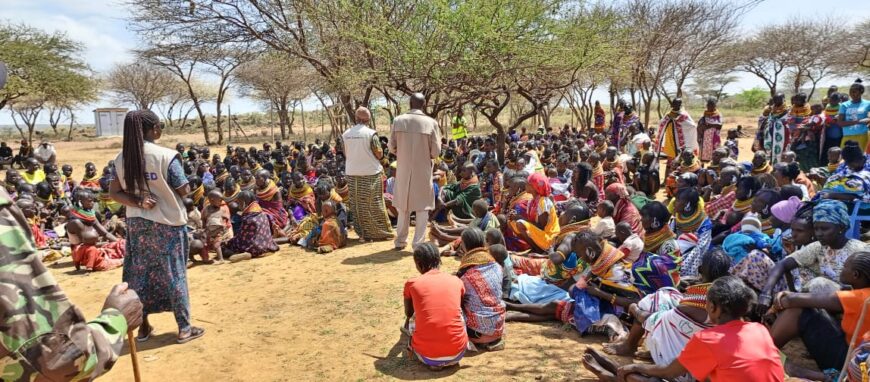Hunger is a chronic problem in the arid and semi-arid regions of Northern Kenya, affecting the local population. As a result, households in the area have adopted different coping strategies to deal with food shortages.
These include reducing portion sizes during mealtimes, decreasing the number of daily meals, and buying food items on credit. To address this issue, Acted is working to improve food and nutritional security in the region, with support from USAID/BHA.
The goal is to save lives, alleviate suffering, and minimize the physical, social, and economic impact of disasters on vulnerable populations.
Alim Lomayan [1] is a 52-year-old married man and father of four boys. He resides in Lpetpet village, located in Lodokejek Ward in Samburu County. Allim is a hardworking member of the pastoralist community, which primarily relies on cattle for their livelihood. Unfortunately, the region has the highest malnutrition rate among all ASAL counties, with a population of 347,336 and a Global Acute Malnutrition (GAM) rate of 15.8%.
Alim has always been determined to provide for his family despite the challenges of living in a harsh environment. He practices subsistence farming on his small farm, growing crops like maize, beans, and vegetables. However, during the drought period, his farm did not yield anything due to the lack of rainfall. This made life very tough for Allim and his family, as accessing food became difficult and prices increased.
To make ends meet, Alim’s wife had to collect firewood to sell at Kisima Market. Although it was dangerous for her due to the threat of elephant attacks and forest scouts who patrolled the area, she risked it all to ensure that the family had enough money to buy food.
The turning point in his life arrived when he was selected as a beneficiary for the unconditional cash transfer program by Acted, in partnership with PACIDA, under the USAID/BHA-funded project. He was chosen based on a vulnerability and community-based selection process that considered factors such as pregnancy and lactation, malnutrition levels, and the elderly. With the help of this program, he was able to provide food for his family and cultivate three-quarters of his farm, yielding 20 kgs of yellow beans.
This cash program has positively changed my life. I can purchase and provide food for my family monthly.
After planting the farm, he waited for the short rains to come. When they did, he harvested 250kgs of beans. This successful harvest allowed him to pay for his children’s school fees and buy additional food items from the market. He was also able to start a kitchen garden with the proceeds from the sale of the beans.
Alim shared that before receiving cash assistance from Acted, he was unable to provide for his family. His wife had to risk her life by fetching firewood and tracking all the way to Kisima to put food on the table. The money came at the right time when he needed it most.
His farm had dried up with the crops that he planted, and he was at the point of losing his mind. He had spent a lot of money to buy seeds and cultivate 2 acres of land, but the rains failed.
However, after receiving the cash, he was able to purchase food for his family, bought beans, planted them, and thankfully harvested 250kgs. Moreover, by selling the beans, he was able to pay his children’s fees. The program has empowered his family to purchase diverse foods, ultimately improving their household nutrition status.
[1] Names of beneficiaries have been changed to protect their identities.

Sustainably restoring livelihood
Alim is one of many residents in Samburu County who have benefited from a project supported by BHA. The project aims to sustainably improve the food and nutritional security of 260,861 vulnerable pastoral and agro-pastoral individuals, including men, women, girls, and boys affected by the drought emergency in Marsabit, Turkana, and Samburu Counties.
The project takes a multi-sectoral approach that enables individuals to meet their food security, nutrition, agriculture, and Water, Sanitation and Hygiene (WASH) needs in the drought emergency. It has a holistic approach that oversees different interconnected sectors such as agriculture, food assistance, nutrition, and WASH to support vulnerable communities to get back on their feet and thrive independently.
The Multi-Purpose Cash program has successfully assisted 3,295 households in Nyiro, Ndoto, Nachola, Waso, and Wamba East within Samburu County. This program was made possible through the collaboration of the Department of Health, NDMA, Local Administration, and the Department of Special Programs.